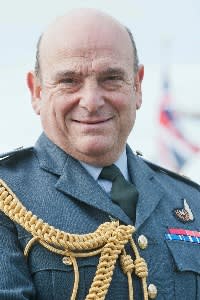[ad_1]
Nato’s most senior military officer has highlighted the “shocking†speed of China’s military modernisation and warned of its growing diplomatic presence overseas, as the alliance prepares to take a more assertive stance towards Beijing.
The comments from air chief marshal Sir Stuart Peach highlight the broad array of security challenges posed by China as members of the alliance struggle to progress beyond a diagnosis of the threat to an agreed plan of action.
“It is quite shocking how quickly China has built ships, how much China has modernised its air force, how much it has invested in cyber and other forms of information management, not least facial recognition,†said Peach — who is stepping down on Friday after three years as head of Nato’s military committee — in an interview with the Financial Times before his departure.
“I think it’s very important to keep an eye on that. What do you do if you’re a leader in China with a modernised powerful large force? You deploy it, you move it around,†he said, adding that there is “further work required†among Nato’s 30 member states in deciding what China’s military ambitions mean for the alliance.
Nato leaders last week warned for the first time that China posed “systemic challenges†to the rules-based international order, perpetrating disinformation, co-operating with Russia and expanding its nuclear arsenal.
But critics say the alliance has yet to develop a detailed China strategy, in part because it is divided internally and lacks tools to deal with concerns such as Chinese involvement in European strategic infrastructure.
Peach pointed to how Beijing had extended its diplomatic reach through outposts such as its “enormous†embassy in Brussels, which is also the main seat of the EU, where Nato is headquartered.
“You have these large embassy footprints now with very large defence sections, often populated by general officers. And then you simply observe, as I would observe after nearly 50 years of service, what’s it all for?†he asked.
Brussels has become a centre of concern surrounding Chinese espionage activities and influence operations. Last year, Belgium’s security agency accused Fraser Cameron, a Brussels think-tanker who had previously worked for the European Commission and Britain’s MI6 intelligence agency, of involvement in a suspected Chinese influence-buying operation.Â
Cameron has denied any wrongdoing and branded the allegations “ludicrousâ€. Belgium has since declined to comment further on the case and has brought no charges in relation to it.Â
China’s mission to the EU said in a statement that military exchanges and co-operation with other countries were an “important part of China’s overall diplomacy†and that Beijing “is actively developing constructive military relations with other countriesâ€.
Peach, who was previously chief of defence staff for the UK armed forces before being appointed to Nato, said he had noticed Beijing’s joint operations with Moscow evolve from being “relatively minor†to involving “major exercises and training opportunities†in recent years. But he dismissed any suggestion that the two countries are heading towards a strategic partnership.Â
The air chief marshal hinted that, on the contrary, as melting Arctic ice opens a northern sea route — which will speed China’s maritime passage to Europe and open up access to untapped energy and mineral supplies — competition could be triggered between the two powers. Moscow is already opening new military facilities in the Arctic, while China has declared itself a “near-Arctic nationâ€.
“I cannot see long-term harmony between China and Russia in the Arctic,†Peach said.
But the departing chief, who has been responsible for maintaining Nato’s diplomatic channel with Valery Gerasimov, chief of the general staff of the Russian armed forces, was less forthcoming about their discussions.
“I’ve known General Gerasimov for many years . . . and our relationship is entirely professional,†Peach said. “The subjects we discuss are designed to keep us all safe and secure.â€
As he prepares to return to London, the air chief marshal raised the prospect that Nato might need to look for sources of funding beyond its target that members commit to spending 2 per cent of their gross domestic product on defence.
At this month’s summit, allies agreed to set up a €1bn fund to invest in new military technologies, from artificial intelligence to robotics. But, he suggested, more could be done. “I’m right about the convening authority this alliance confers, then that is exactly where we should be thinking for the future,†Peach said.
[ad_2]
Source link







